
Toronto is a city of Main Streets, each neighbourhood unique and storied. But there’s a connectivity to the city’s enclaves. The small businesses lining these Main Streets make the city more livable, more vibrant and more diverse. They are the city’s beating heart.
The City of Toronto’s Main Street Recovery and Rebuild Initiative supports the economic recovery and long-term success of these Main Street businesses through a series of seven programs funded with an $18-million Government of Canada investment through the Federal Economic Development Agency for Southern Ontario. From public space-making and neighbourhood programming to commercial rehabilitation and digital training, each program approaches recovery from a different angle and with a common goal – revitalizing the city’s economic, social and cultural heart.
Discover some small business success stories below and learn how the grants, training and resources are impacting Toronto’s Main Streets.
Program: plazaPOPS
Recipient: 2022 plazaPOPS Installations
Total Funding Allocated: $1 million
In a Thistletown parking lot, a block from where Toronto’s Albion Road and Islington Avenue intersect, a gathering place called ThistlePOPS materialized in the summer of 2022.
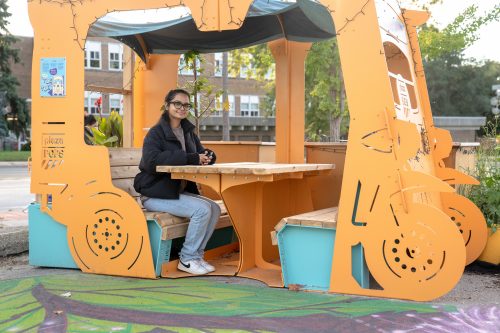
They all represented business owner stories and where they came from. The space really emulated that feeling of being able to do anything and everything in the area and it represented the diverse neighbourhood.
– Vinita Kalia, coordinator with the Albion Islington Square Business Improvement Area (BIA)
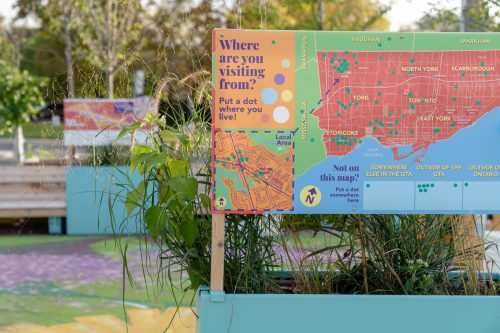
ThistlePOPS was one of four pop-up installations within the Albion Islington Square BIA, each celebrating a different aspect of the neighbourhood and giving the community a spot to gather. Over the course of its installation (which ran from July to late October 2022, ThistlePOPS hosted community programming including the Summer of Joy launch event, the Summer of Innovation back-to-school event, and weekly barbeques, concerts and art classes.
PlazaPOPS plans to install up to 15 pop-up spaces throughout Scarborough, Etobicoke, North York and other areas of Toronto with strip mall plazas by 2024.
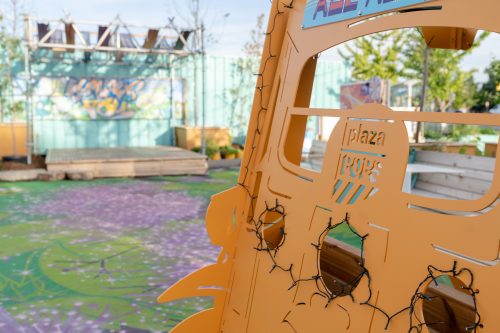
“The program is really focusing on this idea of the overlap between community and economic development… it’s possible to do both at once,” explains Daniel Rotsztain, co-lead of PlazaPOPS. “We’re exploring how the business community can become a major partner in not just the economic viability and success of a neighbourhood, but also public life and social capital development.”
The plazaPOPS team says the impact extends beyond just creating beautiful spaces – the project has the ability to rewire the way community organizations work together.
Program: Little Jamaica – Eglinton West
Recipient: Black Business and Professional Association (BBPA)
Total Funding Allocated: $1 million
In July 2021, the Government of Canada, through the FedDev Ontario Program announced a $1-million investment, over three years, to assist with the revitalization of Little Jamaica. Yet it is a Toronto neighbourhood whose businesses have risked closures due to historical area disinvestment, the impacts of COVID-19 and the Eglinton LRT construction. Funds were provided to the Black Business and Professional Association (BBPA) through a partnership with the City of Toronto and are being used to deliver programs and initiatives to support Black-owned and operated businesses within the Little Jamaica boundaries.
Funding provided by our partners has made a substantial difference in sustaining the Black Businesses in the area. Our areas of focus have been implementing social media, websites, sharing best practices around online stores and online delivery apps, supporting businesses applying for COVID-19 grants to offset rent, energy rebates and developing business plans.
– Michele-Ann Halsall, BBPA Program Manager
The BBPA has opened an office in Little Jamaica, allowing them to effectively deliver programs that address equity and opportunity for the Black community in business, education, employment and economic development.
“Business owners feel comfortable and grateful to be able to stop by our new office with requests, support, questions, assistance with forms, etc.,” says Halsall.
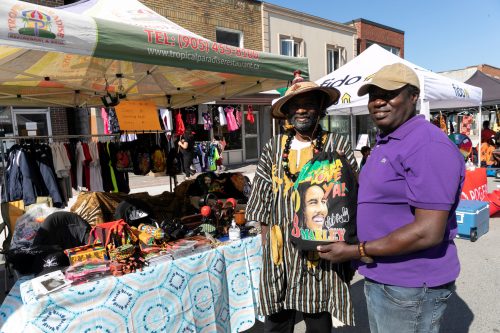
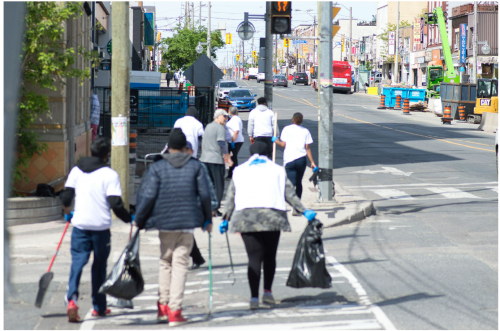
Program: Main Street Innovation Fund
Recipient: Scarborough Arts
Total Funding Awarded: $50,000
To Ali Dbouk, owner of Ghadir Meats & Restaurant in Scarborough, food and storytelling are inseparable. The dishes he serves are a direct link between the community of regulars and visitors to his Scarborough restaurant and the Lebanon he emigrated from in the early 1990s to start anew in Toronto. “We cook the same as we do back home: barbecued and charcoal,” says Dbouk. “Even the olive oil is shipped from back home.” All of it – the quality meats in the locker and Middle Eastern groceries lining the shelves of the pantry, the hand-selected fish and freshly-made meals – are part of Dbouk’s story, a small piece of his homeland he brought with him when he chose the Scarborough neighbourhood of Wexford Heights as his new home.

There’s no question Ghadir Meats & Restaurant has established itself as an institution since it opened its doors in 1991. But the spirit of his story isn’t unique. Spin yourself in a circle at the corner of Pharmacy Ave. and Lawrence Ave. and walk in any direction and you’ll quickly find a similar tale of culinary diaspora. Wexford Heights is a microcosm of Scarborough as a whole – the whole city, really.
This city is built on stories in the form of cuisine. This is exactly what Scarborough Arts was trying to capture when it teamed up with Eat More Scarborough Food Tours, a food tour company, to launch the Culinary Everywhere! Tour Guide Training Program.
Scarborough Arts and Eat More Scarborough worked with partners including East End Arts, Greektown on the Danforth BIA, Wexford Heights BIA, the Culinaria Research Centre at the University of Toronto Scarborough and Feed Scarborough, to develop the Culinary Everywhere! Tour Guide Training Program. Howard Tam and his team at Eat More Scarborough developed training modules for tour guides. “We were able to train 10 local tour guides,” says Derek Spooner, Executive Director at Scarborough Arts. “With the partners, the tour guides were able to develop unique walking tours for various neighbourhoods.” Culinary Everywhere! brought five unique tours to Toronto’s East End and supported 20 local restaurants.
Ghadir Meats & Restaurant was the muster point and first stop for The Art of Spice Food Tour – an exploration of the flavours of the Spice Route, one of five tours produced by Culinary Everywhere! trained guides.
Like Dbouk, Tam has always been drawn to the connection between food and story.
It’s a gateway to a discussion about things like culture, diversity, history and heritage, good and bad. The story of humanity is embedded in the food itself.
– Howard Tam, Foodie-in-Chief of Eat More Scarborough
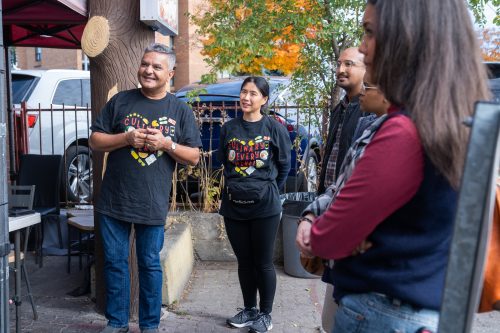
Spooner says the Main Street Innovation Fund enabled them to properly invest in the curriculum and help trainees develop tours that have an additive effect on the community. But Culinary Everywhere! Is proving to be a bigger concept than they initially imagined. “This could be a sustainable model, not only for us but one we could share as a resource for other organizations and cities as well,” he says. “I think we really can help animate and contribute to local cultural tourism (especially) outside the downtown core.”
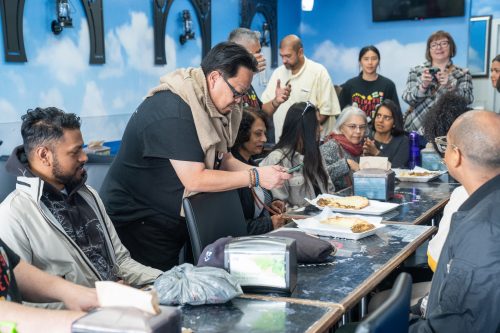
Program: Commercial Space Rehabilitation Grant Program
Recipient: Berkeley Castle Investments
Total Funding Awarded: $20,000
Community groups, like community itself, are meant to be fluid, to change shape and evolve with their community’s needs. But they also must be present and rooted. For Jamii, a charitable arts organization focused on programming for The Esplanade neighbourhood, fluidity has never been an issue.
Since 2011, Jamii has programmed more than 200 events and 400 workshops almost entirely in public places, specifically, David Crombie Park, a stretch of green space parallel to The Esplanade from Jarvis Street to Parliament Street. “It’s at the heart of the community,” says Isorine Marc, Founder of Jamii. “It’s a vibrant place that makes it possible for people to come and create and spend time to get to know their neighbours.” The programming has always morphed to the needs of the community.
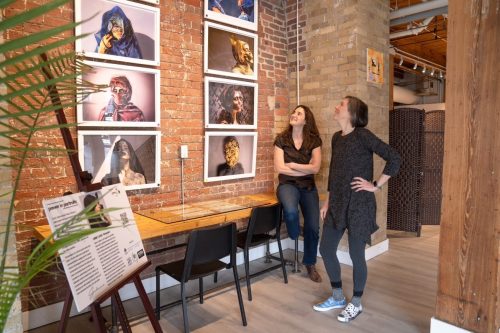
However, Marc has always envisioned a sense of rootedness as well, a space for the public to collect that wouldn’t be at the whim of the weather. Something accessible and flexible, something that didn’t exist, a space that would allow Jamii to engage the community in new ways. And in January 2023, she got an opportunity to do just that – finding space in Berkeley Castle, a defining historical landmark for The Esplanade neighbourhood.
Linda Leistner, owner and property manager for Berkeley Castle Investments, had recently applied for and received the Commercial Space Rehabilitation Grant. The program offers to match funding of 50 per cent for commercial business operators and owners to undertake interior improvements of storefronts that are vacant (or at risk of becoming vacant), helping them re-lease space impacted by COVID-19.
It hadn’t been renovated in about 20 years. We gutted it, upgraded the lighting, painted, and put in new flooring, which was great because then it meant that a tenant like Jamii could then afford to move in because they didn’t have to do a lot of leaseholds.
– Linda Leistner, owner and property manager for Berkeley Castle Investments
Leistner, who’s volunteered with Jamii for several years, knew Marc saw it as her dream space. But the cost to renovate had always made it out of reach for the arts charity. Using the Commercial Space Rehabilitation Grant, Leistner was able to recuperate $20,000 of the $40,000 spent to renovate and create an opportunity for Jamii.
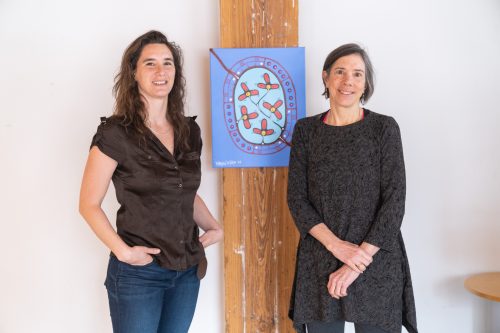
Program: CaféTO Property Improvement Program
Recipient: Decò Italian Restaurant and Wine Bar
Total Funding Allocated: $5,000
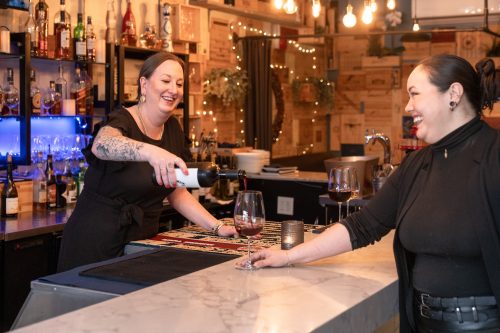
For Decò Italian Restaurant and Wine Bar, setting up a beautiful outdoor space through the City of Toronto’s CaféTO Program helped bring new customers to its space in the Junction neighbourhood.
“Having a huge patio gave us so much exposure (and) don’t forget, I’m on Dundas Street, so there are restaurants everywhere,” says Alessia De Conti Vacca, owner of Decò. “Lots of people came in and said they hadn’t seen us before.” Vacca says she knew it was a good opportunity when the program launched, as it allowed restaurants to capture lost revenue and gave people the extra space to gather.
With so many businesses participating, Vacca wanted to create a space that truly embodied the spirit of Decò, something that would stand out and be inviting and green and make people feel like they were elsewhere, if only for a moment. So they built a new and improved patio in 2022 with the help of the CaféTO Property Improvement Program.
“It costs a lot if you want to do it right,” says Vacca. “We had planters so I had to buy the soil and the plants and do all that – it’s a big job, it took me a full day of work outside.”
But Decò got some relief on the funding side, receiving a grant through the program covered 50 per cent of the expenses up to a maximum of $7,500. Even with the grant, it was an expensive undertaking, admits Vacca. “But it’s worth it for sure.”
Decò was one of 65 operators across Toronto approved for funding under the CaféTO Property Improvement Program to improve their outdoor patio spaces in 2022. As the summer approaches, Vacca says she’s already applied to have the patio again. “My customers want it.”
Vacca says there’s no question the patios do a lot for the neighbourhood and having a grant program to support them makes sense.
It allows the whole neighbourhood to look good… it increases walking traffic and maybe takes some cars off the streets. It promotes the beauty of the city.
– Alessia De Conti Vacca, owner of Decò Italian Restaurant and Wine Bar
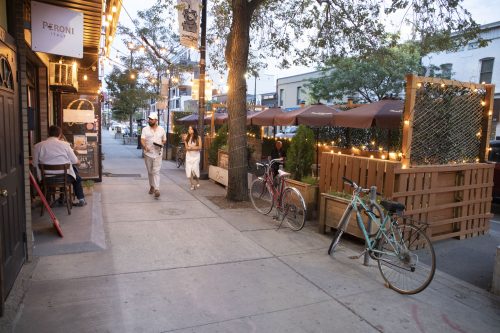
Program: Retail Accelerator Program
Recipient: Tom&Sawyer
Total Funding Awarded: $10,000
When Peter Zakarow and Kristin Matthews launched Tom&Sawyer, their fresh-prepared pet meals business, in 2015, it was to a mostly untapped market. From their commercial kitchen and storefront in Leslieville, they built a market leader catching pet owners’ attention with their all-natural, nutrition-focused pet meals. The Tom&Sawyer brand expanded into hundreds of retailers across the country.
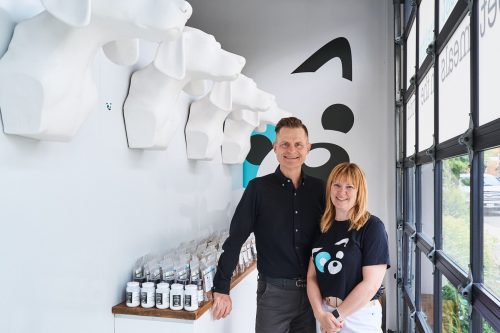
But building a national business had stolen their attention from their roots. Then COVID-19 sharpened their perspective. “We’d been so focused on growing the business nationally… COVID-19 really reminded us of how important the local community was,” says Zakarow.
This was an opportunity for us – during COVID-19 and coming out of it – to really re-establish the fact that we’re an important part of the community. We have such important customers and family pets that have stopped by our shop every single day from the earliest years.
– Peter Zakarow, Co-founder of Tom&Sawyer
They applied for the City of Toronto’s Retail Accelerator program, which provides access to retail training, advisory services, and mentoring opportunities alongside a $10,000 micro-grant to help retail businesses develop and expand. Tom&Sawyer received the grant and training, using it to re-root in the Leslieville community.
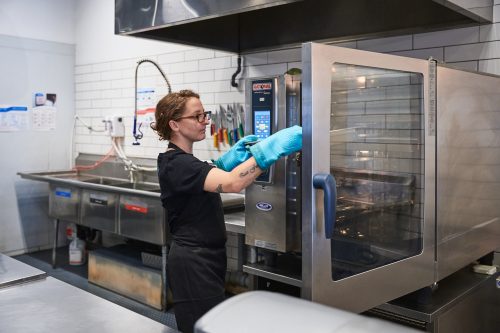
Part of that was putting the money back into Leslieville, says Matthews. “We were one of the sponsors at the Leslieville Beer Fest… we had a booth there and we tied in our bone broth as the beer for dogs and our cookies are made with grains from a couple of the local breweries.”
They participated in a dog-focused market at Riverside, bringing in their animal nutritionist to provide free consultations. “Things to reconnect with the local community as well as people who are coming from outside of the local community to these events,” says Matthews.
With the continuous transit and cars going by the space, Matthews says they realized they were missing the opportunity to make sure people knew precisely what Tom&Sawyer is.
The Retail Accelerator grant and program services allowed us to try different digital marketing platforms than we had previously and the new mix of online advertising reduced our cost of acquisition by 150 per cent.
– Kristin Matthews, Co-founder of Tom&Sawyer
The Tom&Sawyer founders also found the training part of the program allowed them to take a step back and really assess what they were doing. “At that point, we’d been around about seven years and (we) had just been going and going and not stopping and to really think about what we were doing,” adds Zakarow.
Through the Retail Accelerator mentorship, they received valuable insights on employee productivity and motivation as well as marketing strategies geared towards the small business owner. “We were being asked questions like ‘why this or that’ and it forced us in a good way to rethink everything we were doing,” adds Matthews.
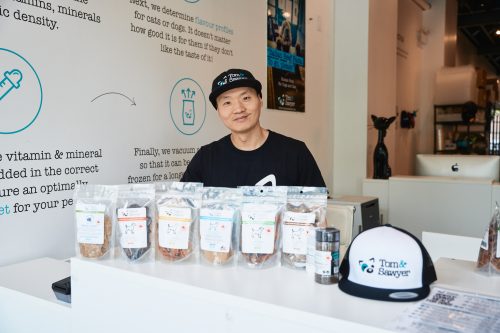
The fresh pet food industry has evolved considerably since Zakarow and Matthews started Tom&Sawyer. Their focus on Canadian-made and natural ingredients has helped them become a sector leader. They’re still one of the few – if not the only – pet food makers in Canada with a space where you can walk right into off the street and see pet food being made. But the Retail Accelerator program helped them re-establish their presence and tap into that essential part of their identity.
Program: CaféTO Property Improvement Program
Recipient: SAVA crepes & coffee
Total Funding Allocated: $1,000
For SAVA Crepes and Coffee, setting up a small sidewalk patio with funding from the CaféTO Property Improvement Program has proven to be a magnet for pedestrian foot traffic.
Walking from Yonge and Eglinton, you don’t really go too far north because you have so much there already. But when you see the small patio umbrellas and people sitting there, you’re automatically like: ‘Oh, something is going on there!’ it’s like an advertisement for the café.
– Sofia Reshetnikova, SAVA owner
“We’re only 700 square feet including kitchen, storage space, dishwashing, and serving,” says Reshetnikova. SAVA has just enough room for five tables inside. “Having the sidewalk café that we have right now is incredible help because we doubled our seating capacity.”
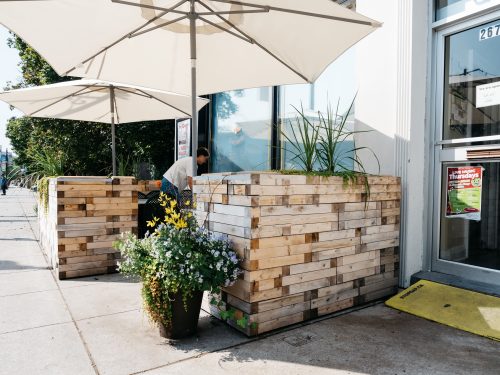
Reshetnikova says she noticed the effects of the new patio space immediately. “We got it installed in May 2023 and May/June were top records for sales.”
It’s a decidedly different experience from SAVA’s first summer. The business opened in November 2021 and went right into the last pandemic lockdown within a month. When that ended, people were hungry for travel, heading overseas for the first time in a few years. It was slow at the café but a learning experience for Reshetnikova. Even still, the appetite for something “a little different” was high, she says. “People were looking for something out of the ordinary.”
While the café captures the essence of a French creperie, SAVA was inspired by Reshetnikova’s Russian roots – and, specifically, the Russian crepes her father cooked nearly every morning on the weekends for the family as tradition.
“I used his recipes as a base for SAVA crepes,” explains Reshetnikova. “And those memories from my childhood of waking up and smelling this buttery flavour in the air and following my nose to the kitchen where there was a pile of crepes.”
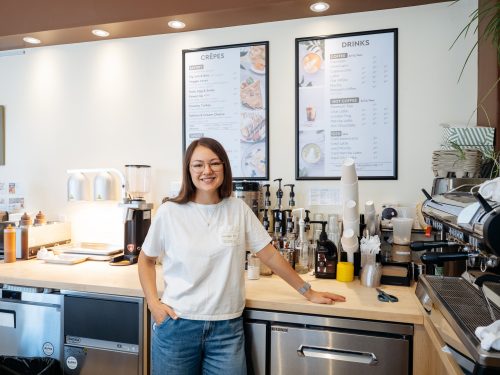
The space itself carries the intimacy of a kitchen, the smells inside similar to the ones of Reshetnikova’s childhood. That sense of comfort is a key part of the café, says the SAVA owner. It’s meant to be a space where people can gather with a friend for a coffee and French-style crepe or pastry and feel like they’re somewhere else.
The patio helps expand on that, creating more seats while still preserving that small, neighbourhood café feel. “It’s a game changer in the summertime,” says Reshetnikova. “It pays off a hundred percent.”
The CaféTO Property Improvement Program offers funding to offset the cost of cafés in the curb lane, sidewalk or on private property undertaken by owners and tenants of commercial and industrial properties.
The program allowed SAVA to experiment. “The installation (of the patio and fence) was $1,000, with 50% covered by the grant,” says Reshetnikova. For the small café, the funding was vital and helped them re-route the money they would’ve spent on the installation toward furnishings to make the space more attractive. The elevated outdoor aesthetic is also the catalyst for social interaction and engagement, making it an invaluable asset for the local community.
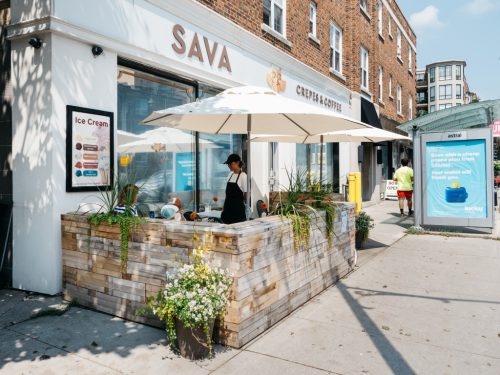
Program: plazaPOPS
Recipient: 2023 plazaPOPS Installations
Total Funding Allocated: $1 million
In the summer months at Wexford Heights’ Colony Plaza, a small group of regulars grab takeaway from local favourite Sahan Somali grill and café and post up in camping chairs under the plaza’s sign, socializing as the sun goes down.
But this past summer they found a new space to gather when the plaza’s owner partnered with PlazaPOPS, a not-for-profit which designs pop-up gathering places in privately-owned public spaces. Three spaces in the parking lot were converted into a hybrid public art-meets- seating area, a tuk-tuk – rather, a picnic booth shaped like the three-wheeled auto rickshaw commonplace around the world.
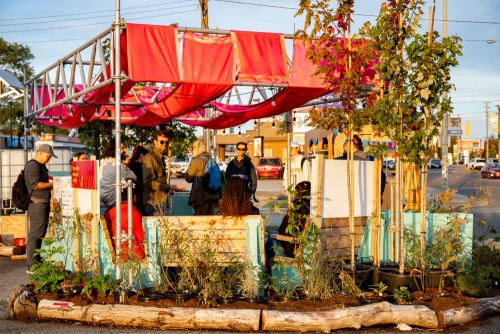
(The group) adopted it as their third place in every sense of the word,” says Daniel Rotsztain. “Like clockwork, they would be hanging out there and we heard a lot of gratitude… this was really a gesture of being seen and supported in their social life and community life.
– Daniel Rotsztain, PlazaPOPS co-founder alongside Brendan Stewart
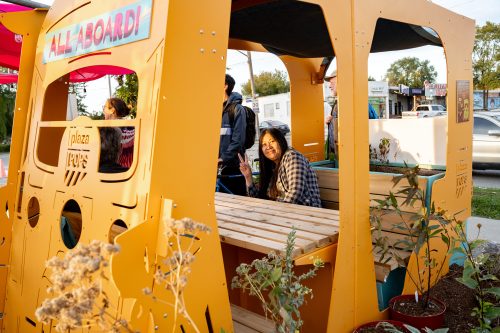
The tuk-tuk was one of four sites set up in Wexford Heights in the summer of 2023 as part of WexPOPS: Wexford Blooms. “We had almost 800 native plants that we purchased as part of the native plant gardens,” explains Rotsztain. PlazaPOPS is designed to draw visitors to the area to revitalize main street businesses while also providing public spaces for events and gatherings.
Wexford Blooms featured 12 events over the summer bringing out around 1,500 attendees. “The other sites were committed to creating these high quality, comfortable and accessible, shady public spaces (demonstrating) the potential of small spaces to transform overlooked and under-invested spaces.” PlazaPOPS piloted its first iteration of the program in Wexford Heights in 2019. The plazaPOPS funding has helped the program to run from 2021 through to 2024, including the return of Wexford Blooms.
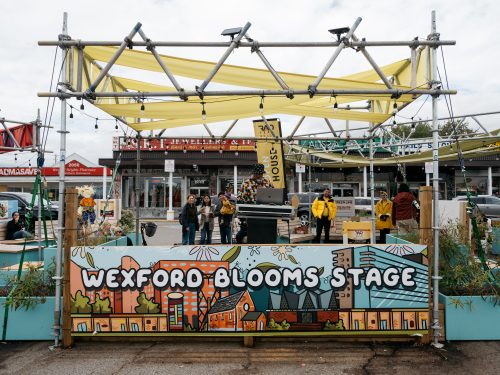
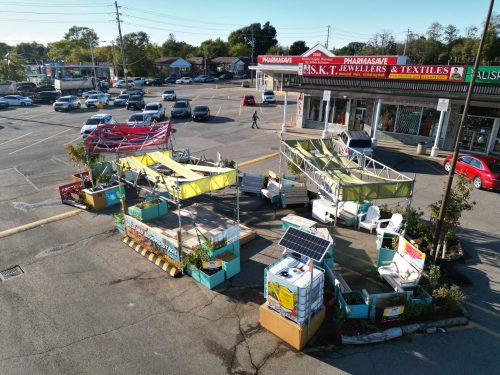
The initiative is propelled by community partnerships alongside local businesses and Business Improvement Areas (BIAs). “We work on a local anchor partner model with community organizations that already have a vast social network there,” says Rotsztain. “They are attuned to the hopes, visions and needs of the community so we don’t want to replicate that work.”
Wexford Blooms, partnered with Working Women Community Centre and collaborated with For Youth Telecare Family Services, a Korean-lead organization supporting events with youth volunteers and hosted art exhibitions committed to sustainability.
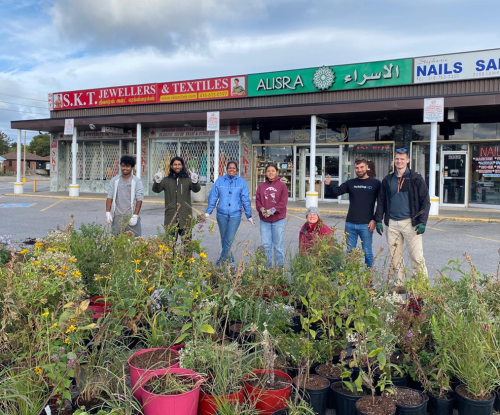
Another major partnership was with the West Scarborough Neighbourhood Community Centre, who we worked with to hire five youth Site Stewards. It was the first job for many of them, and we hired them in a supportive environment where they gained many skills, including communication, gardening, and team working skills.
– Rotsztain
Rotsztain says this year’s iteration of the program helped highlight the reverberating effect PlazaPOPS is having in communities. It also signals the potential of the model.
“We want to show what’s possible when you bring partners across sectors that don’t often intersect like universities and small businesses and community organizations and the BIAs and the city itself,” says Rotsztain. He hopes it will inspire other groups.
Program: Commercial Space Rehabilitation Grant Program
Recipient: The Knit Cafe
Total Funding Awarded: $19,550
For two decades, The Knit Cafe has been a gathering point for Toronto’s knitting community. Even as it traded its hybrid coffee shop/knitting location on the still up-and-coming Queen West of the early 2000s for a cozier, knitting-focused space in the Roncesvalles neighbourhood, the layout had always centred around the ability to gather and connect.
When owners Kristin Ledgett, Iwona Gontarska, Kate Austin, Matthew Muller, and Andrea Dorfmann were looking for a new space for The Knit Cafe on Dundas St W in Little Portugal, they wanted to somehow preserve that sense of coziness while having room to welcome a knitting community that had grown amidst the backdrop of the pandemic.
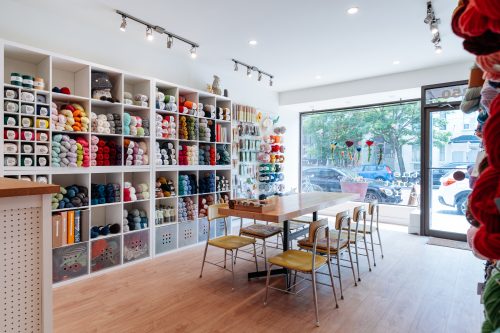
The whole idea of our business is to invite people into our space to learn and share,” says Ledgett. “In the old space, people were always tripping over each other and walking sideways to get past each other and brushing things off the shelves.Kristin Ledgett, The Knit Cafe owner alongside Iwona Gontarska, Kate Austin, Matthew Muller and Andrea Dorfmann
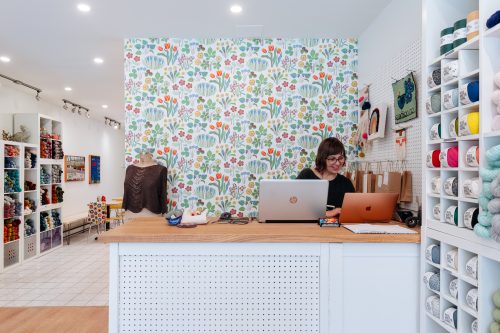
Drawn to the creative energy of Dundas West, the owners looked at five different places. There was only one that fit the layout they wanted. “The space was pretty rough when we found it,” says Ledgett. But a well-timed newsletter from the City of Toronto introduced them to the Commercial Space Rehabilitation Grant, a program funded by the Federal Economic Development Agency for Southern Ontario.
The program, delivered through the City of Toronto’s Main Street Recovery and Rebuild Initiative, offers to match funding of 50 per cent for commercial business operators and owners to undertake interior improvements of storefronts that are vacant (or at risk of becoming vacant).
The Knit Cafe received around $20,000 through the grant. “Moving is never cheap and when you have to set up a whole new space – we needed to do new floors, new ceilings, new everything – it was an expensive project,” says Ledgett. “If we didn’t have access to the grant, it would’ve significantly impacted our business.”
Ledgett says replacing the ceiling was a massive endeavour. Since the atmosphere is a critical part of the business, they had to pull out the dingey drop ceiling and return it to its regular height to open up the space.
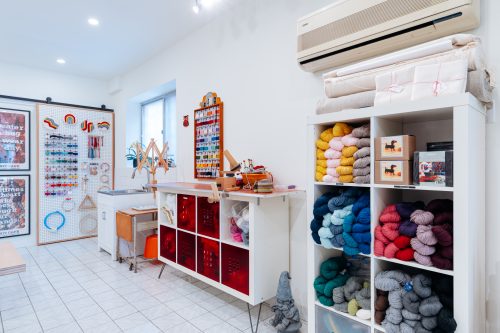
When you don’t have the money to do something, you make concessions,” says Ledgett. “We might have made different decisions if we didn’t have that money and then we wouldn’t have ended up with as beautiful and welcoming of a space… it would have impacted our business.Ledgett
The Knit Cafe recently relaunched its workshop series after taking a major hiatus throughout the pandemic. “We’ve had 30-plus people at every event,” she says. In their old space, Ledgett says they would’ve been bursting at the seams.
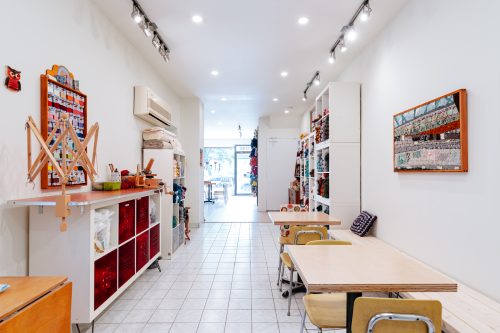
The new space gives ample room for The Knit Cafe to grow its business and its community.
Ledgett says they plan to ramp up social meet-ups, classes and workshops. “We have this great big table with room around it for people to pass each other and still sit at the table and (there’s) beautiful natural light coming in and lots of great lights that people can see their crafting work,” she says. “It’s a really hospitable environment.”
Click the 1/6 playlist icon in the top right of the video to scroll to the next story.
For more information and how to apply, see Toronto Main Street Recovery and Rebuild Initiative.